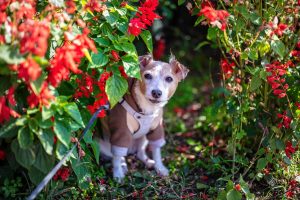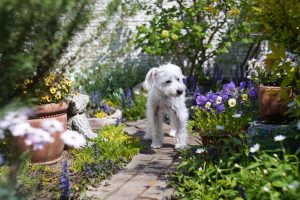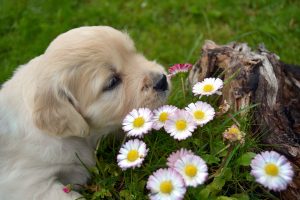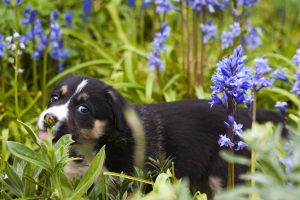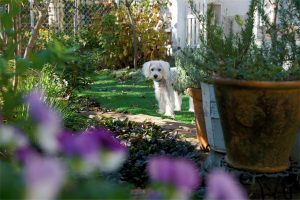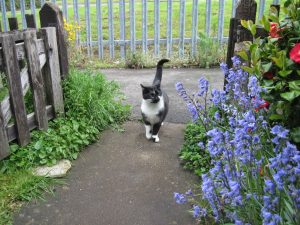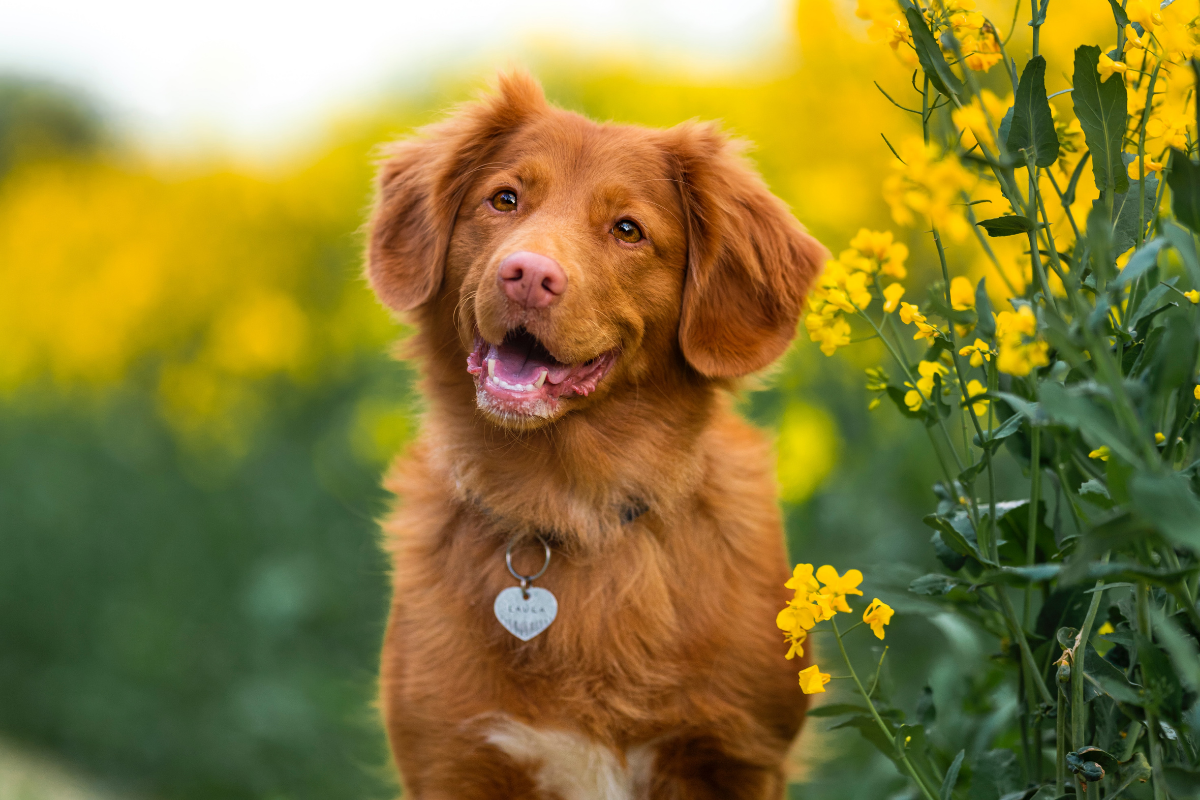
Pet Friendly Gardens
Are you looking for pet friendly perennials for your garden? Taking care of your four-legged friends includes protecting them both inside and outside which means creating a safe garden for them to play in. Whether they are exploring, playing catch, or rolling in the grass, we need to make sure we have created a safe environment for our pets to play in. There are safe varieties and ones to avoid planting for the health of your dogs and cats. In addition, there are also perennials to add to your garden to keep unwanted pests away!
Create a Safe Outdoor Space for Your Pups
Dogs love to jump, run, explore and smell everything! As very curious animals, dogs want to know about their surroundings. They learn from all the smells they encounter which may get them into trouble when it comes to some plants. Getting too close or chewing on the wrong type of plant can be harmful to your four-legged best friend. Although you cannot monitor what is planted in your neighbourhood, you can make sure your backyard is safe for your pup to roam free. Thankfully, there are many perennials that are safe for your pets. A few of our favourties you can add to your garden are Columbine (Aquilegia), Coral Bells (Heuchera), Phlox, Bee Balm (Monarda), and Rose of Sharon (Hibiscus). These varieties add great colour to the garden. Even though your dog might not be inclined to ingest harmful foliage, you still might want to add friendly varieties to your garden. This will take the worry away and lead you to explore new plants for your garden! Robust and established perennials such as astilbe and nepeta are excellent as they are strong and can better withstand dogs walking through your garden beds. Roses are another safe plant for your garden space. Their attractive and fragrant blooms provide beauty and colour to your garden! Small fruit (strawberries, blueberries, raspberries) are also safe for dogs, as long as they are ingested in small quantities and are treated only with organic fertilizers. With many plants available which are safe for your pets, it is easy to have a beautiful garden which is safe for inquisitive and playful pups.
There are a few common perennials that are toxic or harmful to dogs. Some plants you may be interested in growing in your garden, or might already have, are Hostas, Dicentra ‘Bleeding Heart’, Clematis, Iris, Wisteria, Allium and Hydrangea. These are all harmful to dogs and cats. A very common harmful perennial to note is Acontium (Monkshood) also known as wolfsbane. This is only a short list of harmful plants. The most common outcome of eating toxic perennials is gastrointestinal issues, dehydration, vomiting and depression. However, before you dig up your favourite plants, take note if your pet has any interest in any these plants. If your pet does not tend to chew or trapse through your garden, certain varieties may be alright in your outdoor space. When planning out your garden, make sure to check the varieties to see if they are safe for your fur-babies. When out for a walk, make sure your dog is on a leash and be mindful of the plants they are taking extra interest in.
Keep Your Outdoor Cats Safe
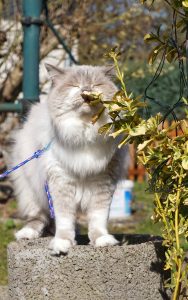
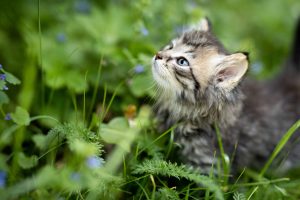 Outdoor cats explore mostly on their own, so it especially important to keep harmful plants for cats out of your garden. As dogs can be monitored, cats are known to be more independent. A few popular perennials for gardens that are known to be toxic or irritants to cats are rhododendrons, azaleas, lilies, and convallaria. Plants toxic to cats tend to cause inflammation to the skin, mouth and stomach. Lilies however are known to cause fatal kidney damage to cats within less than 3 days (this includes eating small amounts of leaves, petals, or pollen). If you are looking for some friendly perennials to add to your garden that cats are sure to enjoy, add Nepeta (Cat Mint). It’s easy to grow, and your cat will love it! It is a great perennial for your garden beds and borders, attracts bees and butterflies, and is appealing in colour. A benefit for both your garden and your cat. Just be warned, you might be inviting all the neighbourhood cats with your cat mint!
Outdoor cats explore mostly on their own, so it especially important to keep harmful plants for cats out of your garden. As dogs can be monitored, cats are known to be more independent. A few popular perennials for gardens that are known to be toxic or irritants to cats are rhododendrons, azaleas, lilies, and convallaria. Plants toxic to cats tend to cause inflammation to the skin, mouth and stomach. Lilies however are known to cause fatal kidney damage to cats within less than 3 days (this includes eating small amounts of leaves, petals, or pollen). If you are looking for some friendly perennials to add to your garden that cats are sure to enjoy, add Nepeta (Cat Mint). It’s easy to grow, and your cat will love it! It is a great perennial for your garden beds and borders, attracts bees and butterflies, and is appealing in colour. A benefit for both your garden and your cat. Just be warned, you might be inviting all the neighbourhood cats with your cat mint!
Deterring Garden Pests
While you want to take extra precaution to protect your pets in the garden, you can also use plants to deter other animals from your garden. After putting much care, thoughtfulness and hard work into you garden, one of the most frustrating things is waking up to a destructive mess made by deer, raccoons, rabbits, mice and squirrels. Echinacea is a perfect perennials to deter those unwanted guests. There are many gorgeous varieties of echinacea. They have long blooming times throughout the summer and attract bees and butterflies. A delightfully scented plant to ward off pests is Perovskia (Russian Sage). It is a very useful plant for its long blooming season and fragrant foliage. Perovskia boasts abundant, spiky bloom clusters of lavender-purple, adding a striking statement piece to your garden beds. It is also great for cut flowers! Nepeta ‘Catmint’ that your cats will love also keeps pests away from your garden. Deer are put off by poor tasting foliage, bad textures, and strong smells. As an additional bonus, these varieties are all safe for both dogs and cats! Remember to make sure your deer resistant plants are only unfavourable to pests, and not to your much-loved pets.
Many pets have the innate ability to avoid plants that will make them ill, but it is good to keep a watchful eye on your pet’s interactions with new plants in your garden. If you have dogs or cats in your life you know the importance of keeping them safe. When sending your beloved pets outside it is key to have a safe yet beautiful garden for both of you to enjoy. When owning cats and dogs, you don’t need to give up your love of gardening, however it is important to be mindful of what you plant. Pets are part of your family. Create the best garden area for your whole family to enjoy, even your four-legged members.
For a wider list of pet-unfriendly plants, visit the ASPCA’s list of toxic and non-toxic plants for pets. If you suspect your dog or cat has ingested a toxic plant, contact your local veterinarian. Just like people, our pets can be sensitive and show allergic reaction to any plant.
To find a retailer near you, visit Find a Retailer.



